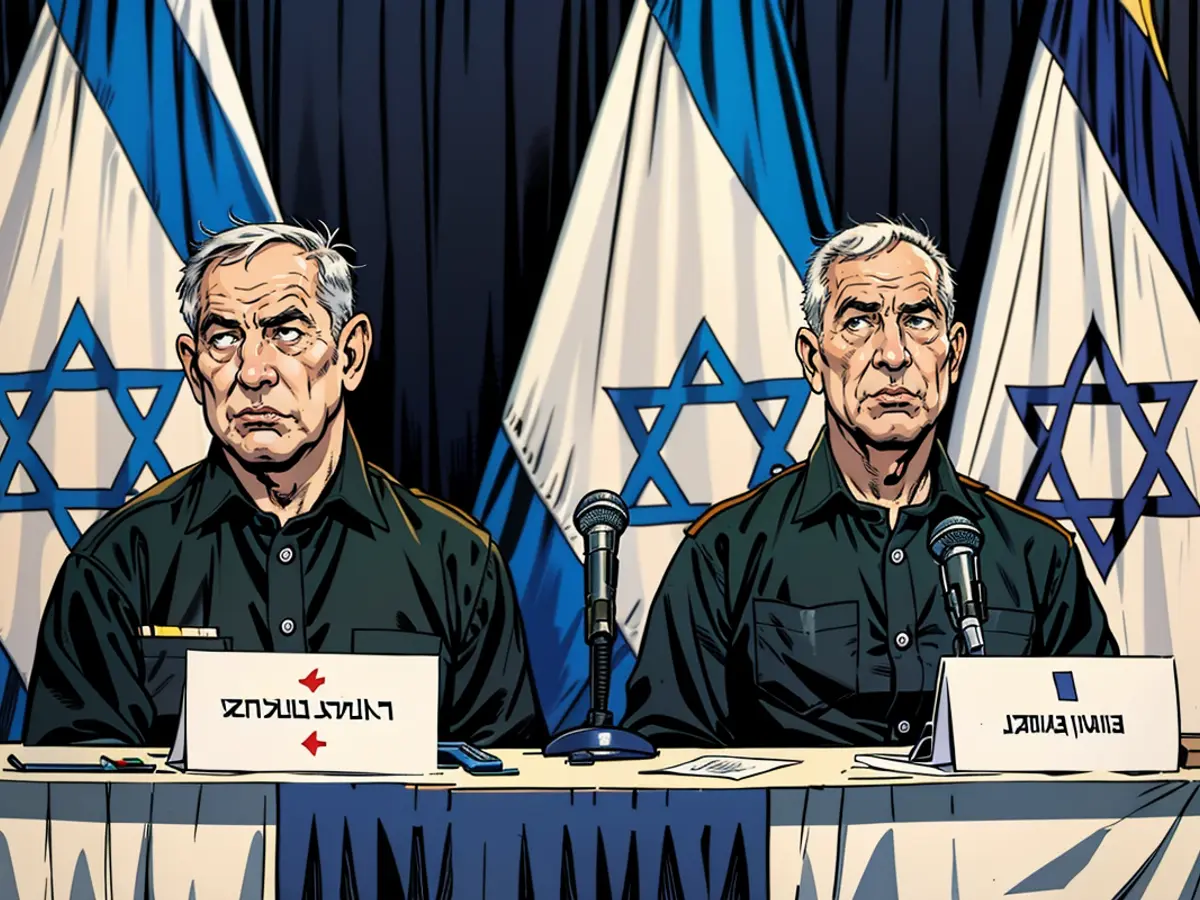Tensions in Israeli politics heighten as confrontations with Hezbollah intensify
Instead, the political sphere was pulsing with whispers that Prime Minister Benjamin Netanyahu was Planning to dismiss Defense Minister Yoav Gallant and appoint a military newcomer, Gideon Sa’ar, to bolster his domestic strength. High-ranking security officials were blunt. "It'll consume his time to learn the job for months," stated Gadi Eisenkot, a highly regarded former Israeli military chief and opposition member.
However, the series of explosions via pager and walkie-talkie, resulting in numerous fatalities, injuries, and agitated Lebanese nerves, hindered this scheme, at least temporarily. The escalated tension with Hezbollah provided Gallant with a reprieve. Reports in the Israeli press suggest that this reprieve for Gallant is merely temporary, and Netanyahu still intends to dismiss him.
Policy and domestic politics in any democracy are inseparable. But in Netanyahu's Israel, they are particularly intertwined – especially now.
Political motivation
The Israeli government maintains that intensifying the conflict with Hezbollah was necessary to return over 60,000 displaced residents in northern Israel to their homes. Ever since the October 7 attacks by Hamas, Hezbollah has been launching attacks on Israel in solidarity with Hamas and Palestinian militants in Gaza. Consequently, hundreds of thousands have also been displaced due to Israeli bombings in Lebanon.
Returning northern residents to their homes is a political priority in Israel, and because the cabinet included this as a war objective, it has also become a policy goal. Nevertheless, escalating the conflict with Hezbollah impedes Netanyahu's aim to dismiss Gallant.
Remarkably, Netanyahu convened a security meeting on Wednesday, but he did not invite his defense minister. Instead, he invited Itamar Ben-Gvir, a national security minister with a conviction for incitement. Ben-Gvir has previously been excluded from war-related decision-making, despite multiple requests.
Recently, following the approval of a US-supported mediation attempt with Lebanon, Netanyahu faced severe criticism from his right-wing allies, who suggest that only military action can eradicate Hezbollah from the border. Ben Gvir's party held an emergency meeting – making an implicit threat to disband the coalition. This criticism prompted Netanyahu to release a statement opposing an immediate ceasefire, and when he issued another statement announcing his participation in the US-led mediation process, he did so only in English, not Hebrew.
In waging war on Hezbollah, the Israeli government strives to decouple Lebanon from Gaza. Hezbollah claims that its attacks on Israel are in solidarity with Palestinians in Gaza; Israel seeks to stop Hezbollah's attacks without a Gaza ceasefire and hostage exchange. But, among the Israeli national security class, there is widespread belief that Netanyahu is prolonging the conflict in Gaza because he is aware that once it is resolved, he will face immense pressure to call elections.
Family members of the 101 hostages in Gaza regularly blame the prime minister for buying time and prioritizing his political survival over the national interest.
"I believe it's primarily a political issue," Eyal Hulata, senior fellow at the Foundation for Defense of Democracies and a former national security advisor to the Israeli prime minister, told CNN of the failure to reach a ceasefire in Gaza. "The IDF (Israel Defense Forces) and the defense minister have been clear that they believe that the situation in Gaza allows for a hostage exchange, and that they support a hostage exchange.
"If Netanyahu wanted to end it, he could. So, I guess that's not his intention at this point."

Historical tensions
Netanyahu and Gallant have long had strained relations, despite a period of unity following Hamas' October 7 attack.
The two often clashed over the war in Gaza. In August, Gallant told a closed-door Knesset committee that Netanyahu's goal of "total victory" in Gaza was absurd, according to Israeli media. Netanyahu responded by publicly reprimanding Gallant for embracing an "anti-Israel narrative."
Gallant was also highly critical of Netanyahu's emphasis on Israeli control over a strip of territory along the Gaza-Egypt border, known as the Philadelphi Corridor, calling it a "moral disgrace." During cabinet discussions, he voted against continuing occupation there, seeing it as a hindrance to a ceasefire and hostage exchange. "If we want the hostages alive, we don't have time," he said.
With both the Philadelphi Corridor and Hezbollah, Netanyahu's critics have questioned why, if they were so critical, he waited months to confront these issues. Netanyahu argues that it was a "progression of military escalation."
"The tension between Netanyahu and Gallant is long-standing and deeply personal," Gilad Malach, a researcher at the Israel Democracy Institute, told CNN. "But above all, Netanyahu wants to keep his coalition."
Indeed, when the prime minister previously attempted to dismiss Gallant, in March last year, it was to oppose Netanyahu's proposed judicial reforms – an issue that could have dismantled the government.
The idea that Gallant might be dismissed over the judicial reforms led to an immediate wave of protests, which became known in Israel as the "Night of Gallant." Eventually, Netanyahu backed down. One of the factors deterring Netanyahu from dismissing Gallant now is his fear of another such night.
The risk to the coalition due to the proposed bill for the Haredim is quite significant, stated Malach. Consequently, Netanyahu will do whatever is necessary to maintain the coalition. If Gallant poses an obstacle to preserving the coalition, he'll take all necessary measures to remove him from his post.
The concern over mandatory military service for ultra-Orthodox Jews has been a contentious issue in Israel since its inception. Ultra-Orthodox Jews, who consider Torah study as their highest duty, had been exempt from compulsory service. However, this year, the Supreme Court ruled that this exemption infringed on equal protection principles, necessitating the IDF to commence drafting.
The ultra-Orthodox parties, essential to Netanyahu's rule, have been endeavoring to draft legislation to reinstate an exemption into law. Despite their threats to leave the coalition in the past, their dissatisfaction with the IDF's current mandate to enlist ultra-Orthodox men remains a looming danger.

Gallant, a thorn in Netanyahu's side, advocates against providing the ultra-Orthodox an exemption. Sharing this view with many military leaders, he believes that all Jewish Israelis should share the military service burden and refuses to support any law lacking broad political support.
Sa'ar, who Netanyahu intended to replace Gallant, is said to have stronger relations with the ultra-Orthodox parties.
Eisenkot, the former IDF chief of the General Staff, opined that the ultra-Orthodox issue was at the core of Netanyahu's desire to dismiss the defense minister.
"Dismissing Gallant – and I'm not Gallant's biggest fan – serves political objectives, aiming to pass the conscription law, thereby damaging the IDF," stated Eisenkot. "This is a further manifestation of Netanyahu's cynical policy."
With Netanyahu's backing, the ultra-Orthodox parties aim to pass a military exemption bill when the Knesset returns following the Jewish High Holidays in October. Even if the law passes, the Supreme Court is almost certain to strike it down, according to Malach.
"However, the point is that you're gaining time. And this is the most crucial thing for Netanyahu," he said. "In the short term, the whole term is for him. Because until the Supreme Court decides, he will have one year, two years – that's sufficient."
This short-term strategy might also apply to Hezbollah. Despite the ongoing debate about a possible Israeli invasion of Lebanon in the near future, there is no discussion about what a long-term settlement with Israel's neighbor might entail.
Michael Shemesh, a correspondent for Israeli broadcaster Kan accompanying Netanyahu to New York this week, reported that journalists asked an aide to the prime minister about the possibility of Gallant being dismissed.
"We don't do politics during wartime," the aide replied. "There were reporters who couldn't help but laugh," Shemesh said.
Dana Karni contributed to this report.
Despite the escalated tension with Hezbollah providing Defense Minister Yoav Gallant with a temporary reprieve, reports suggest that Prime Minister Benjamin Netanyahu still intends to dismiss him. This move could potentially help Netanyahu achieve his political goal of dismissing Gallant, especially in regards to the controversial issue of mandatory military service for ultra-Orthodox Jews, which Gallant strongly opposes. The ongoing conflict with Hezbollah has hindered Netanyahu's aim to dismiss Gallant, but it has also provided him with an opportunity to reshape his cabinet and strengthen his domestic political position in the world.








